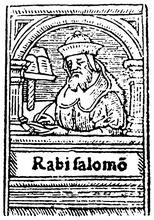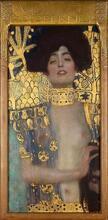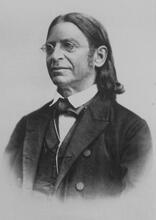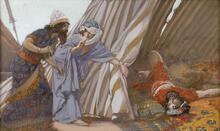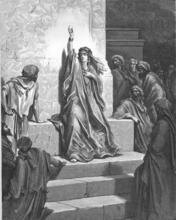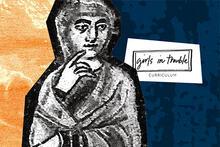Deborah 2: Midrash and Aggadah
Rabbinic literature presents Deborah, one of the most extraordinary women in the Bible, as an extremely righteous and praiseworthy woman. She is described as a teacher of Torah, a worker for the Temple, and the source of redemption for Israel. Her song (Judges 5) is counted among the great songs of the Bible. Though some traditions criticize her pride, perhaps wary of how she transgressed gender norms, most of the rabbinic texts about Deborah are filled with praise and awe at her leadership in the war of liberation against Sisera.
Deborah is presented in the rabbinic sources as a very talented woman. She was an upright judge, with the same prophetic ability as Samuel; Torah she-bi-khetav: Lit. "the written Torah." The Bible; the Pentateuch; Tanakh (the Pentateuch, Prophets and Hagiographia)Torah scholars would come to learn from her. This ability was granted to her as reward for her good deeds, namely, the preparation of wicks for the Tabernacle. She also encouraged her fellow Israelites to regularly attend the synagogue and Tabernacle, and thanks to her beneficial influence on her husband, he merited a portion in the World to Come. There is a tradition that presents Deborah as being guilty of the sin of pride, which led to her loss of the gift of prophecy, while the other traditions speak in her praise, and number her among the twenty-three Israelite women of outstanding righteousness (A type of non-halakhic literary activitiy of the Rabbis for interpreting non-legal material according to special principles of interpretation (hermeneutical rules).Midrash Tadshe, Ozar ha-Midrashim [ed. Eisenstein], 474).
Wife of Lappidoth
Jud. 4:4 states that “Deborah, wife of Lappidoth [eshet lapidot], was a prophetess.” The Rabbis derive “eshet lapidot” from the word lapid (torch) and this phrase would therefore refer to her vocation, which was preparing the wicks for the Tabernacle (BT Lit. "scroll." Designation of the five scrolls of the Bible (Ruth, Song of Songs, Lamentations, Ecclesiastes, Esther). The Scroll of Esther is read on Purim from a parchment scroll.Megillah 14a). Another tradition understands lapidot as relating to her husband, who was unlettered. She told him: “Come and I will make wicks for you, which you will take to the Tabernacle at Shiloh. Thus your lot will be with proper people, and you will merit the life of the World to Come.” Deborah prepared thick wicks that would give much light; these her husband would bring to the Tabernacle, thus earning him the appellation of “lapidot.” Deborah’s husband had three names: Barak, Michael, and Lappidoth: Barak, because his face was like lightning; Michael, because he would lower (memikh) himself, or after the angel by this name; Lappidoth, because of the wicks that he would bring to the Tabernacle at Shiloh. Deborah caused Lappidoth to be one of the fit individuals who would merit the life of the World to Come. The Rabbis applied to Deborah and those like her the verse (Prov. 14:1): “The wisest of women builds her house.” When God, who tests people’s innermost thoughts, saw Deborah’s actions, He told her: “Deborah, you intended to increase My light; I, too, shall increase your light in Judah and in Jerusalem” (Seder Eliyahu Rabbah [ed. Friedmann (Ish-Shalom)], para. 10, 48–49; Yalkut Shimoni, Judges 4, para. 42). This exegesis interprets the phrase “Deborah, wife of Lappidoth, was a prophet” as a depiction of cause and effect. Since she was “eshet lapidot,” she became “a prophet.” Her wisdom and prophetic ability were the reward for her good deeds. This midrash also identifies Barak son of Abinoam as Deborah’s husband (see also below, “Deborah and Barak”).
Deborah’s tribal affiliation is unclear from the Bible. She is aided by Barak, from the tribe of Naphtali, and by a number of additional tribes that participated in the war. The midrash traces her lineage to Naphtali, which is consistent with the tradition that Barak was her husband. In the exegetical expansion, when Jacob blesses his sons before his death he mentions Deborah in his blessing of Naphtali (Gen. 49:21): “Naphtali is a hind let loose, which yields lovely fawns”; “a hind let loose” is a reference to Deborah, who would be born into this tribe (Midrash Tehillim [ed. Buber], 22:1).
Deborah the Judge
The midrash relates that in Deborah’s time the Israelites worshiped idols and therefore were delivered into the hands of Sisera, who “oppressed Israel ruthlessly” (Jud. 4:3). Once they repented, He sent them Deborah and Barak who redeemed them (Tanhuma [ed. Buber], Behar 7). Another hermeneutical tradition has the Israelites refusing to heed the upright judges Deborah and Barak, for which they were punished with the famine that is mentioned in Ruth 1:1: “In the days when the judges ruled, there was a famine in the land.” The judges mentioned in Ruth are Deborah and Barak (Ruth Rabbah 1:1).
In Jud. 4:5 Deborah “used to sit under the Palm of Deborah,” which is understood to symbolize the state of the people. According to one interpretation, Deborah would sit under the palm tree and teach Torah she-bi-khetav: Lit. "the written Torah." The Bible; the Pentateuch; Tanakh (the Pentateuch, Prophets and Hagiographia)Torah in public. In Israel’s sorry state, however, those who came to learn from her were only as half a date tree, and so she was said “to sit under a palm” (Seder Eliyahu Rabbah, Chap. 10, 50). Another tradition asserts that that generation was united in its faith in God, as can be learned from the palm tree: just as the latter has a heart (all its branches issue forth from the same place), so, too, was that generation, who had only a single heart for their Father in Heaven (BT Megillah 14a). Others, however, do not view this palm tree as symbolic. Deborah would sit outdoors, under a palm, to teach Torah in public, because a woman would not normally be alone with men within her house (Seder Eliyahu Rabbah loc. cit.).
Deborah the Prophet
Deborah is included among the seven women prophets of Israel enumerated by the Rabbis: Sarah, Miriam, Deborah, Hannah, Abigail, Huldah, and Esther (BT Megillah 14a). The midrash asks why Deborah had to judge Israel and prophecy to them in a generation when the High Priest Phinehas ben Eleazar was still alive. Rather, a person’s deeds dictate whether they merit attaining the spirit of divine inspiration, whether Gentile or Israelite, whether man or woman, and even if a slave or handmaiden. Deborah was granted wisdom and prophecy because of her deeds, the preparation of thick wicks for the Tabernacle (see above). Deborah “was a prophet […] She used to sit […] between Ramah and Bethel” (Jud. 4:4–5); and of Samuel it is said (I Sam. 7:17): “Then he would return to Ramah, for his home was there, and there too he would judge Israel.” In this manner God rewarded Deborah for her good deeds. Just as Samuel was at “Ramah,” so, too, was Deborah at “Ramah” (Seder Eliyahu Rabbah, Chap. 10, 48–50). This exegesis interprets “Ramah” (literally, height) as descriptive of the spiritual qualities of the prophecy of Deborah and of Samuel, in order to compare Deborah’s prophetic ability with that of Samuel, the great prophet.
In the midrashic account, prophecy departed from Deborah because of her pride. The Lit. "teaching," "study," or "learning." A compilation of the commentary and discussions of the amora'im on the Mishnah. When not specified, "Talmud" refers to the Babylonian Talmud.Talmud declares that when a person becomes haughty, if he was a sage, his wisdom departs from him; and if a prophet, his ability to prophesy departs from him. The Rabbis learn of this loss of prophecy from Deborah, who boasted (Jud. 5:7): “Deliverance ceased, ceased in Israel, till you arose, O Deborah, arose, O mother, in Israel!” (In this verse Deborah portrays the helplessness of Israel that continued until she arose and delivered Israel.) In the midrashic reading, prophecy departed from her as punishment for her arrogance, leading her to plead (v. 12): “Awake, awake, O Deborah! Awake, awake, [Deborah,] strike up the [prophetic] chant!” In these words Deborah requests that the prophetic spirit return to her (BT A seven-day festival to commemorate the Exodus from Egypt (eight days outside Israel) beginning on the 15th day of the Hebrew month of Nissan. Also called the "Festival of Mazzot"; the "Festival of Spring"; Pesah.Pesahim 66b). According to another tradition her haughtiness expresses itself by the fact that she sent someone to call for Barak (Jud. 10:4) and did not go herself. The Lit. "teaching," "study," or "learning." A compilation of the commentary and discussions of the amora'im on the Mishnah. When not specified, "Talmud" refers to the Babylonian Talmud.Gemara comments that haughtiness is not becoming for women. Deborah and Huldah are guilty of the sin of pride and consequently both of them received ugly names: Ziburta (bee) and Karkushta (rat) (BT Megillah 14b). These midrashim might possibly evince a certain degree of Rabbinic displeasure with the character of Deborah as reflected in the Biblical narrative, and with the upsetting of the accepted balance of power between the sexes.
Deborah and Barak
In other narratives in the Book of Judges (such as those of Ehud son of Gera, Gideon. and Samson), one central figure leads and judges the people and is also responsible for their political deliverance. The story of Deborah differs, in that a number of characters participate in leading the people: Deborah represents the word of the Lord and judges the people; military deliverance is effected by means of Barak, the military commander; and, in the end, it is Jael who overcomes Sisera and kills him. The division of labor between Deborah and Barak in the Biblical narrative is replete with tension, a fact that did not escape the attention of the Rabbis. One tradition presents Barak as Deborah’s husband, who is also called “Lappidoth” (Seder Eliyahu Rabbah, Chap. 10, 48–49), thus attempting to ease the tension between them by explaining it as that between man and wife.
The Biblical narrative presents Deborah as a strong woman who gives orders to Barak. She also comes to the battlefield, where she chants her victory song. Barak, in contrast, radiates a lack of confidence when he asks Deborah to join him on the battlefield. The midrash notes that this was not the initial situation. Barak was the chief character, who assigned himself a secondary role. His primacy is taught by Deborah’s telling him (Jud. 4:6): “The Lord, the God of Israel, has commanded: Go, march up […] and take […].” He places himself in a subordinate position when he says to her (v. 8): “If you will go with me, I will go; if not, I will not go.” Barak told Deborah: “If you will go with me to Kadesh [to rally Zebulun and Naphtali], I will go with you to Hazor [for the war against Sisera]. But if you will not go with me to Kadesh, I will not go with you to Hazor.”
Another interpretation has him telling her: “If you will go with me to song, I will go with you to war. But if you will not go with me to song, I will not go with you to war.” These interpretations differ as to whether Barak took a subordinate role to Deborah only regarding war, or also regarding song. Deborah responds (v. 9): “Very well, I will go with you. However [efes], there will be no glory for you […] for then the Lord will deliver Sisera into the hands of a woman.” The Rabbis interpret the word efes as the Greek, meaning cease, leave off, for Barak abandoned what he possessed. Deborah tells him: “Do you think that the glory of song will be granted solely to you?” Consequently, Barak became secondary to Deborah also in song, as it is said (Jud. 5:1): “Deborah and Barak son of Abinoam sang (va-tashar).” In this verse, Deborah is mentioned first, and the feminine form of the verb (va-tashar) also refers to her (Gen. Rabbah 40:4). This midrash restores the “order” between the sexes. It maintains that, from the outset, Barak should have been the one to effect the victory and also to sing the song. Since he behaved improperly and made himself subservient to Deborah, he was punished by becoming secondary in the warfare, Sisera being killed by Jael, while the victory song was chanted by Deborah. The presentation of the relationship between Deborah and Barak as both exceptional and objectionable reaffirms the patriarchal family structure of the Rabbinic period.
In another tradition, Barak’s statement relays a lack of faith, and not a weak nature. Deborah tells him (Jud. 4:14): “Up! This is the day on which the Lord will deliver Sisera into your hands: the Lord is marching before you,” to which Barak replies (v. 8): “If you will go with me, I will go.” In the midrashic retelling, Deborah is asking him: Is it me that you need? “The Lord is marching before you!”—when a flesh-and-blood king’s servants and armies go forth to war, he follows behind, but God does not do so: He precedes His armies (Tanhuma, Shoftim 17).
Other traditions, in contrast, take a favorable view of the cooperation between Deborah and Barak. The former says: It is written in the Torah (Deut. 19:18): “And the magistrates shall make a thorough investigation,” which is immediately followed by (20:1): “When you take the field.” This juxtaposition teaches that the judges are to go forth to war with the people, which is why Deborah joined Barak. She saw with the spirit of divine inspiration that God would deliver Israel from the Gentile peoples by individuals who attend the synagogue and Houses of study (of Torah)bet midrash (academy) early and late, and constantly engage in daily Torah study—by them, or by those who serve them. Barak accordingly merited to be the deliverer of Israel, since he had served the elders both during Joshua’s lifetime and after his death. This explains why Israel’s great salvation was effected by the tribes of Zebulun and Naphtali: Naphtali had served Jacob, who was pleased by him; and Zebulun had served Issachar and provided for him (Issachar taught Zebulun Torah) (Seder Eliyahu Rabbah, Chap. 10, 50–51). Continuing this hermeneutical direction, the inclusion of Barak’s name in the headline of her song is also regarded favorably by the Rabbis. Barak trusted in the God of Israel and believed in Deborah’s prophecy and therefore merited participating in her song, as it is said (Jud. 5:1): “Deborah and Barak son of Abinoam sang” (Seder Eliyahu Rabbah, Chap. 10, 51).
Miracles in the War
The midrash attributes the great salvation for Israel to the merit of Deborah and Barak (Seder Eliyahu Rabbah, Chap. 12, 58–59) and the Rabbis tell of the various miracles that were performed for Israel during the war: the sun stood still, and night became day (Eccl. Rabbah 3:14:1); another midrash lists six miracles that were performed on that day (the miracle was that the day was greatly extended, and these six things that happened in the course of it should have occurred over the course of many days): all on that same day, the Israelites came to Deborah and asked her to pray to the Lord about Sisera, Deborah sent for Barak, Barak rallied the soldiers, the war was conducted, Sisera was killed, and the booty was divided. Consequently, they sang that day, as it is said (5:1): “On that day Deborah and Barak son of Abinoam sang” (Eccl. Rabbah 3:14:1).
The Rabbis applied to this war Ps. 19:3: “Day to day makes utterance, night to night speaks out.” Joshua’s day speaks out that of Deborah. Joshua’s day witnessed the performance of the miracle (Josh. 10:13): “And the sun stood still and the moon halted,” and similarly, in the day of Deborah (Jud. 5:20): “The stars fought from heaven, from their courses they fought against Sisera” (Midrash Tehillim 19:9).
Deborah and Barak recited the Hallel prayer after seeing the miracles that God performed for them. They said (Ps. 115:1): “Not to us, O Lord, not to us but to Your name bring glory for the sake of Your love and Your faithfulness,” and the spirit of divine inspiration responded (Isa. 48:11): “For My sake, My own sake, do I act.” It was enacted that Israel recite Hallel at every important epoch and at every misfortune that comes upon the world; and when they are redeemed, they recite it for their redemption (BT Pesahim 117a).
The Song of Deborah
The Song of Deborah has become one of the fundamental elements of the poetry of the Jewish people. The Rabbis include it in their list of ten songs: the song of Israel in Egypt, the Song at the Sea, the song at the well, the song of Moses, the song of Joshua, the Song of Deborah, the Song of David, the Song of Solomon, the song of Jehoshaphat, and a new song for the future (Mekhilta de-Rabbi Ishmael, Masekhta de-Shirah, Beshalah 1. This list varies in different sources; see J. L. Kugel, “Is There But One Song,” Biblica 63 [1982], 329–350).
The Talmud prescribes the manner in which the scribe is to write the Song of Deborah: the Song at the Sea and the Song of Deborah are written “tile above brick, and brick above tile” [literally: blank (space) over print and print over blank] (The interpretations and elaborations of the Mishnah by the amora'im in the academies of Erez Israel. Editing completed c. 500 C.E.Jerusalem Talmud Megillah 3:7, 74b). This special format, which gives the appearance of a brick wall, visually distinguishes these songs from the rest of the Biblical text. These are the only two of the above Biblical songs that are written in the formal style which stresses the poetical structure and the parallelism between the hemistiches.
The midrash explains that Deborah used her song to educate Israel to walk in the ways of the Lord. She said (Jud. 5:2): “When locks go untrimmed in Israel [or: when Israel is avenged]”—by means of whom does God take vengeance of the nations of the world who vex Israel? “When people dedicate themselves” (Jud. 5:2)—by means of the people who attend the synagogue and bet midrash (academy) early and late, respond “Amen,” and bless God with “Amen.” “Bless the Lord!” (Jud. 5:2)—by those who bless the Lord every day (Seder Eliyahu Rabbah, Chap. 11, 52). In this verse Deborah encouraged the Israelites to participate in prayer and study, and by the merit of those who do so, God will deliver them from their enemies.
The Rabbis maintain that anyone for whom a miracle was performed and who recites a song, is forgiven for his sins and becomes as a new person. During the time of Barak and Deborah a miracle was performed for the Israelites, they recited song, and all their sins were pardoned. From what do we learn this? Everywhere it is written “the Israelites again did what was offensive to the Lord,” but here, after the song, the Bible states (Jud. 6:1): “Then the Israelites did what was offensive to the Lord”; thus, they were forgiven for all the sins they had committed until then (Midrash Tehillim 18:6).
Another midrash explains that the Song of Deborah is composed of an admixture (i.e., of statements by different people). The person who said this did not say that. Sisera’s mother asked (Jud. 5:28): “Why is his chariot so long in coming?” His wife questioned (Jud. 5:2): “Why so late the clatter of his wheels?” And her daughters-in-law declared (v. 30): “They must be dividing the spoils they have found.” Everything that they said was revealed to Deborah by the spirit of divine inspiration. Deborah then sent to Sisera’s mother the message: Do not await Sisera any longer; from now on “So may all Your enemies perish, O Lord!” (v. 31) (Midrash Samuel [ed. Buber], 10:4).


